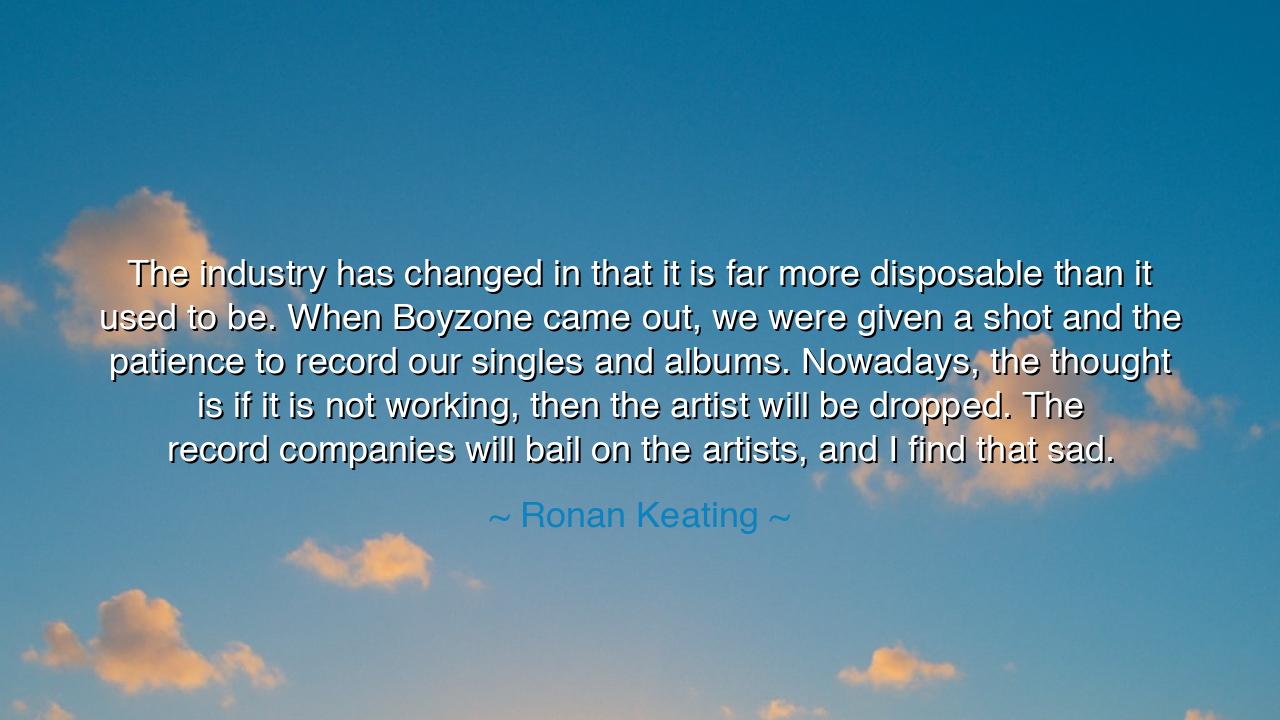
The industry has changed in that it is far more disposable than
The industry has changed in that it is far more disposable than it used to be. When Boyzone came out, we were given a shot and the patience to record our singles and albums. Nowadays, the thought is if it is not working, then the artist will be dropped. The record companies will bail on the artists, and I find that sad.






Hear, O children of song and seekers of truth, the lament and wisdom of Ronan Keating, who declared: “The industry has changed in that it is far more disposable than it used to be. When Boyzone came out, we were given a shot and the patience to record our singles and albums. Nowadays, the thought is if it is not working, then the artist will be dropped. The record companies will bail on the artists, and I find that sad.” This utterance is no mere complaint, but a cry of sorrow from one who has witnessed the transformation of art into commodity, of music into transaction. He speaks of the old days when artists were nurtured like seedlings, given time to grow, and of the new days when they are plucked too soon, discarded if their fruit does not ripen instantly.
The origin of this truth lies in the great shifts of the musical world. Once, the craft of music was seen as a journey. Singers and bands were allowed to stumble, to learn, to develop their voices across albums and years. In those times, record labels acted as guardians, patient in their investment, believing that true art required time to blossom. But now, in the age of immediacy, where profit speaks louder than patience, the industry has become like a marketplace of fast goods, consuming artists quickly, discarding them when they do not yield instant returns.
Consider, O listeners, the story of The Beatles, who in their earliest years did not explode into fame overnight. Their first recordings were uncertain, their performances raw. Yet they were allowed to grow, to find their sound, to refine their craft. By the time their music ripened, they reshaped not only an industry but the entire culture of a generation. If they had been born in an age of disposability, perhaps they too would have been cast aside after their first faltering attempts, and the world would have been deprived of their revolution in song.
Keating’s words are therefore a warning: when the record companies demand only instant success, they silence voices that might have blossomed with time. They trade lasting artistry for fleeting novelty, depth for surface, endurance for speed. And in doing so, they impoverish not only the artists but also the listeners, who receive songs designed to burn bright and vanish, rather than music that endures like an ancient hymn. The sadness Keating names is not only his own—it is the grief of a culture that risks forgetting the value of patience.
This truth extends beyond music. In every realm of life, we see the same disease of disposability. Relationships abandoned at the first hardship, projects discarded at the first setback, talents left undeveloped because they did not bring instant reward. Yet the ancients knew: true greatness ripens slowly. The oak does not grow tall in a single season, nor does wisdom flower in a single day. To abandon too quickly is to destroy the very harvest we long for.
The lesson, then, is clear: whether in art, in work, or in love, we must practice patience. Give yourself time to grow, give others the chance to stumble and rise again. Do not demand instant perfection, for that is a myth. If you are a creator, persevere even when the world is impatient. If you are a leader, nurture those under your care, giving them room to fail, to learn, and to thrive. And if you are simply a listener in the symphony of life, value not only the glitter of the new, but the depth of what is allowed to endure.
Practical actions flow from this wisdom: support artists not only when they are at their peak, but also in their early struggles. Seek out music, books, and works of art that grow with time, rather than only consuming what is immediate. In your own endeavors, resist the temptation to measure success only by quick results. Instead, honor the process, trust the journey, and let patience be your guide.
Thus do we honor Keating’s words: that the artist is not disposable, that true music requires patience, that growth is stunted when abandoned too soon. Carry this teaching, O children of tomorrow, into every realm of life. Nurture what you love. Defend what matters. And above all, remember that time is the soil in which all greatness grows.






AAdministratorAdministrator
Welcome, honored guests. Please leave a comment, we will respond soon